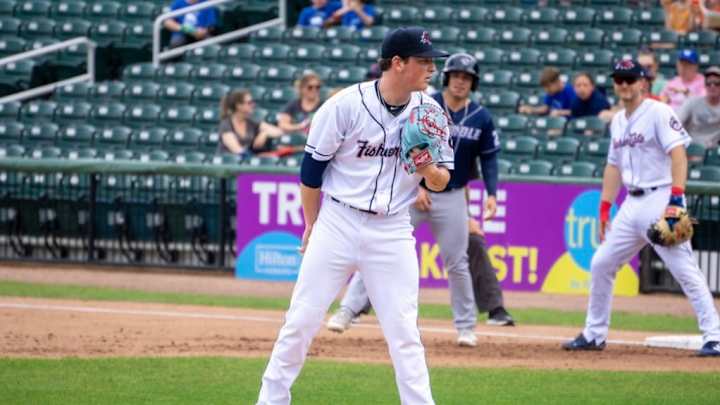Versatile Hayden Juenger Embraces Unique Role in Blue Jays System

Strict pitching roles are on the way out.
Starters don't toss complete games anymore, your best reliever isn't tied to the ninth inning, and some teams even dabble with openers.
Modern pitching staffs are changing, and Hayden Juenger is built for the flux. Throughout his baseball career, Juenger has started, closed, and soaked up middle innings. Some players need a clear role to flourish, but he thrives in the in-between. Rapidly climbing the Blue Jays' farm system and pushing the big leagues, that versatility is Juenger's biggest weapon.
"I just kind of embrace the role of when my number's called, whatever I need to do, I'm going to do it," Juenger said. "I just think that's kind of eased everything."
Juenger floated between closer and starter on teams growing up, but his first big role change came two starts into his collegiate career. After a pair of shaky outings, which lasted five total innings with six runs against, Juenger was removed from Missouri State's rotation and pushed to the bench.
"That was my first real look in the mirror moment," Juenger said. "Whatever I was doing wasn't good enough."
Juenger's next opportunity didn't come for three frustrating weeks, watching the Bears drop 11 of their first 14 games from the sidelines. When Missouri State's starter was knocked out early against Oklahoma and the Bears needed someone to soak up innings in another loss, Juenger got his shot at redemption. The Sooners finished that season 45-24 and were ranked as a top-25 team at points, but against Juenger, they were mostly neutralized.
Missouri State dropped the game 11-1, but Juenger pitched 5.1 innings of efficient relief, with one earned run against and four strikeouts. While some may have folded facing almost immediate failure, Juenger's initial bump shaped the rest of his collegiate career, signaling a permanent move to the 'pen. He began in long- and middle-relief before eventually winning the closer job. A year later, he became the sixth-round pick of the Blue Jays in the 2021 MLB Draft.
Like many of Toronto's top draft choices, Juenger just got a taste in his first pro season, working 20 short-burst frames in the lower minors. He worked exclusively out of the Vancouver bullpen in that initial season, never pitching more than two innings at a time. But even then, the Jays saw starter potential, or at least someone who couldn't be limited to a single inning.
In year two, Toronto pushed Juenger, moving him aggressively up to Double A to start the 2022 season and slid him back into a rotation for the first time since his freshman year. The 21-year-old's role for New Hampshire still wasn't traditional, though, tasked with nine to 15 outs every start and never coming back out for a fifth inning.
In his first four outings, Juenger struck out 17 batters and walked just one. Pairing a high velo fastball with a deceiving change and an improving slider, the righty grew into what Blue Jays bullpen coach Matt Buschmann called a "quasi-starter role."
In 20 outings in Double A this season—less than a year after he was drafted—Juenger struck out 10.8 batters-per-nine while walking just 3.4. He had to re-find his routines, falling back on experiences switching from relief to rotation in high school and college, but the new role helped maximize the righty's repertoire, stamina, and leverage capabilities.
"[The Blue Jays] are open with me about the role," Juenger said. "So I love that, you know. They're upfront with what they want to do with me."
But, as is normalcy in Juenger's baseball path, the success earned him another role change. In July, the Blue Jays pushed him back to the bullpen and up to Triple A Buffalo. He'd still be a multi-inning guy, but now it's two innings in relief, not three or four to start. Despite a new challenge and new routines to re-learn, the same success followed.
At its core, minor league development is about helping the big league team win games, and Juenger knows it. He looks around baseball today and sees starters going four or five innings and some teams using openers for a few frames. He sees the spot for him as a bridge, bulk, leverage long-man or whatever you want to call it, and the Jays do, too.
“I’m just trying to be the most valuable player I can be to help the team win,” Juenger said.
It's not easy adjusting routines, changing roles, and never really knowing your usage on any given day. But those unknowns, and the ability to embrace them, have helped Juenger climb Toronto's minor league system with haste.
He's currently 6.1 years younger than the average age of his Triple A opponents, and with flexibility to help the big league team in a variety of ways, it may not be long before he makes the next jump.
